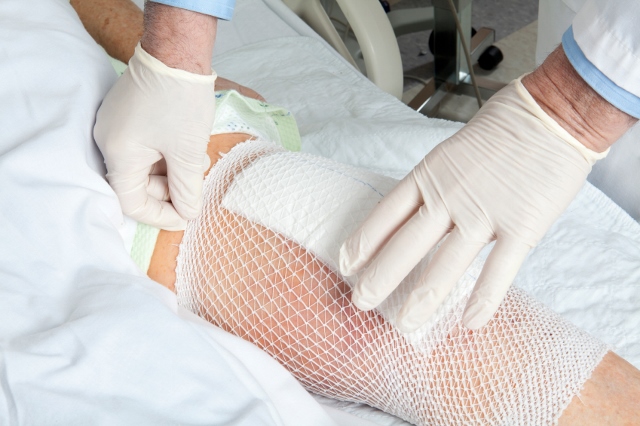What should I expect after my knee replacement?
How should I prepare for my knee replacement?
Total knee replacements are becoming an increasingly common surgery. Knee replacements are often performed on patients with severe osteoarthritis, which causes pain and/or buckling of the knee resulting in loss of function, such as difficulty walking, squatting or climbing stairs. (Osteoarthritis is caused by the loss of joint cartilage resulting in bone spurring, commonly known as “bone on bone”). During a knee replacement the ends of the thigh and shin bones are replaced with hardware in order to alleviate the pain produced at the arthritic knee joint.
So, what should you expect following your knee replacement? You can be certain that you will have physical therapy. You will likely start your therapy in the hospital, then transition to an outpatient facility after you return home. Your surgeon might even have you perform exercises before surgery in order to maximize your flexibility and strength, thereby making your post-operative recovery faster. Pre-operative exercises are often prescribed either at the physician’s office, or you may be sent to a physical therapy facility for a one-time visit that will include exercise instruction.
You can expect to have a substantial amount of knee pain immediately after surgery and for several weeks thereafter due to the trauma of the surgery itself. However, your pain can be managed with the use of prescription pain medication, a walker or cane when walking, and management of swelling with ice, compression stockings and leg elevation. It is extremely important to keep up with your prescribed regimen of pain medication, icing and elevating for the first several weeks after surgery in order to minimize your knee pain and better tolerate your rehab experience.
After a total knee replacement your physical therapy rehab is equally important to having the surgery itself. You cannot expect to have good outcomes with your new knee if you do not put in the time and effort rehabilitating it post-op. Your physical therapist will instruct you in a variety of exercises that will work on improving your knee range of motion, flexibility, strength, swelling and scarring that will ultimately allow you to return to routine daily activities like walking, squatting and stair climbing without pain or the use of an assistive device.
You will likely attend physical therapy for 6-8 weeks after surgery; this varies on an individual basis. Full recovery often takes 6-9 months, and you may still notice swelling for up to 1 year. Your new knee is meant to enable you to perform everyday activities, but not necessarily aggressive or high impact sports such as running, tennis or skiing. Most knee replacements will last upward of 20 years, and you can help prolong the life of your new knee by managing your weight and staying active without over-stressing the new joint with high impact activities, such as those mentioned above.
K. Collins


It’s good to know what to expect after knee replacement surgery. My dad is probably going to need to get his replaced, so I will have to show him this. I didn’t realize that physical therapy started before you even left the hospital!
Great to hear, if you need any other advice, I would be happy to help!